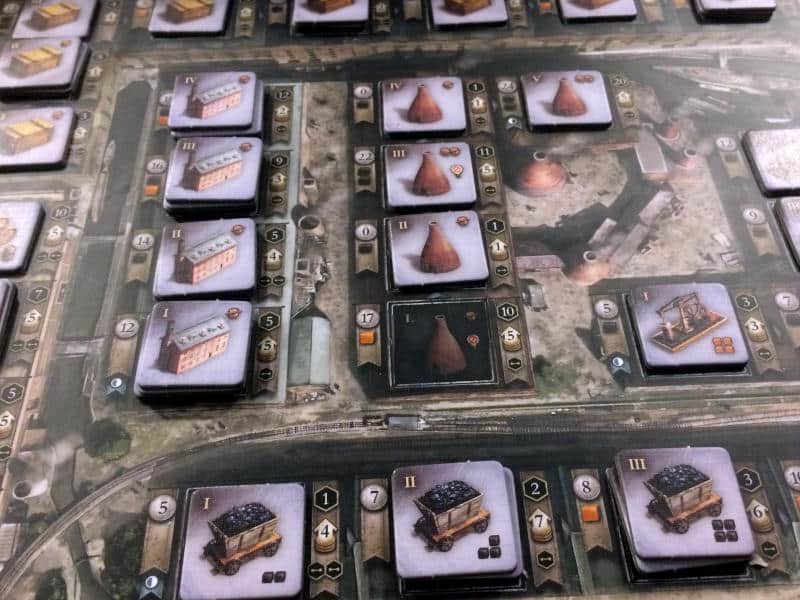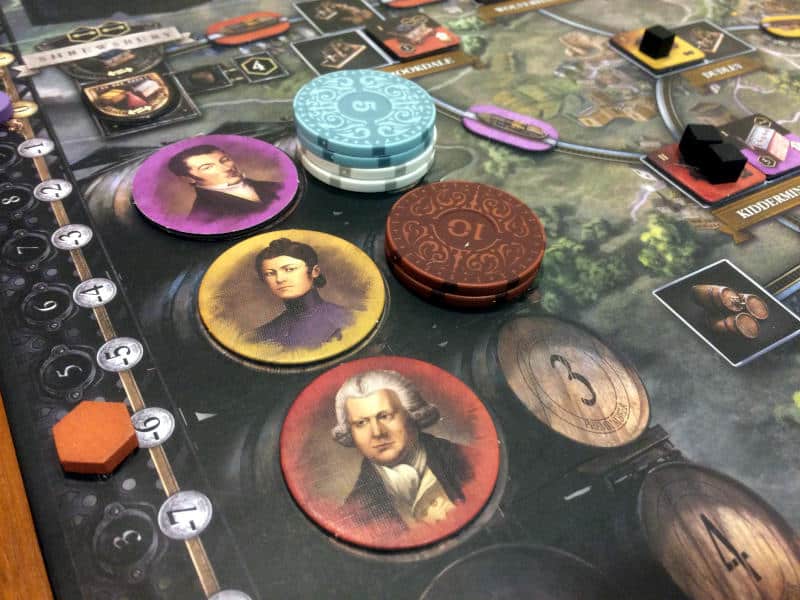| Release Date: 2018 | Players: 2-4 |
| Designer: Gavan Brown, Martin Wallace, Matt Tolman | Length: 90-180 minutes |
| Artist: Damien Mammoliti, David Forest, Lina Cossette | Age: 14+ |
| Publisher: Roxley Games | Complexity: 3.5 / 5 |
| Plastic (by weight): 20% | Air (by volume): <25% |
The canal era was over. It was the time of the steam railways. The industrial revolution was in full swing and coal was at the heart of new, booming industries. A lot of iron was needed to build the infrastructure that would allow resources and goods to be shipped around the country. The workforce needed to be kept happy and beer was the perfect lubricant for this task. The rise of cotton mills, potteries and manufacturing gave us the opportunities to earn our Brass: Birmingham by Gavan Brown, Matt Tolman and Martin Wallace from Roxley Games.
Yes, it’s time for my second review of the wonderfully illustrated and highly competitive economic simulation game Brass: Birmingham. Having played it digitally many times, I knew I had to get myself a copy. I also knew I definitely wanted the amazing poker chips. So eventually I treated myself and ordered the deluxe version of this game. Now, having played the physical version a few times, I’m ready to look at how this game continues to delight and how the experience differs from its digital sibling.
Setup
Let me start with one of the main differences between the online and physical versions: the setup. Many games require quite a bit of work before they are ready to play, but it does feel like Brass: Birmingham stands out. The biggest two jobs that I think take the longest time are sorting through your industry tiles and placing them in the correct locations on your player board, followed by removing merchant tiles not in play for the current player count, shuffling them and dealing them out onto the relevant locations on the central game board.
Similarly, you have to sort through the deck of location and industry cards and remove those that aren’t in play for your specific player count, before shuffling them and dealing the relevant number to players. Next comes placing the correct number of coal and iron cubes onto the market area of the central game board, as well as putting beer barrels on the relevant spaces underneath merchant tiles.
It does take a while to get the game ready and it’s easy to miss something or accidentally have cards in play that are for a different player count or put the wrong industry tile in the wrong space on your player board. So you do have to focus during setup, which does make the game feel longer to set up than others, I think.

Table Presence
However, once it’s ready, Brass: Birmingham looks amazing on the table. You can choose between the day or the night side of the board. They are functionally the same and only differ in the representation of the map. One is lighter, the other darker. Either way, the map just looks stunning. It exudes a sense of luxury. You immediately feel transported into the seat of one of the eight industrialists that are described near the beginning of the rulebook. They clearly have lived a life of grandeur and opulence. They seem to look down on you and expect you to go from humble beginnings to becoming the owner of a national, industrial empire, just as they did – and that’s no small feat.
I strongly recommend you either go for the deluxe edition or buy decent poker chips. The cardboard money that comes with the base game simply detracts from the luxurious feeling that the rest of the components convey. You want to hear the clink of the chips as you stack them in front of you. You want to feel the weight in your hands as you have to pay for actions. After all, Brass: Birmingham is an economic simulation. So making the money an active and tangible part of the game is so important. You do need the tactility and sound they make. Every time you spend or earn money, you want to feel its heaviness.
The cards, wooden cubes and beer barrels are also amazing. They lift the game experience. Feeling the linen-finished cards in your hands is a pleasure. Moving coal or iron cubes around the board creates a sense of how these resources flow. The same is true for the beer barrels that play a small, but very important part in the game.
Continual Enjoyment
Having played the game quite a number of times now, both in digital as well as physical form, I can assure you that it never gets boring. Maybe I’m biased, because I clearly love economic simulation games, but every game of Brass: Birmingham is different. The player count will change things up, but also the order in which cards come out. Hand management is such an important part, as well as timing. Deciding what you must do now and what can wait until later is often critical. Be careful which card you choose to play, because you don’t know what cards you will draw next.
Then you have to consider what other players are likely to do next. You might be able to delay building your coal mine, if it looks like nobody else is likely to get theirs out in the location you’re planning to put yours. Placing more canals might be the better choice for the moment, as it will open up the map for you and you could even block other players from reaching the locations they seem to aim for.
As I said, timing plays a huge role in Brass: Birmingham. Sometimes the game becomes a race to build your pottery before everyone else or to connect to a port and deliver your goods before another player snaps the beer and the related bonus away from under your nose.
There are so many considerations and decisions to make at every turn. Even while you wait for everyone else to take their actions, you need to pay attention and keep a close eye on your competitors. At the same time, you need to think about what you want to do next and if you have the money to afford it.

Money Makes Brass Go Round
In a way, money doesn’t matter in the game. You can always take loans, especially early on. In fact, you’re missing a trick if you don’t take a loan. After all, Brass: Birmingham is a proper economic simulation. Loans give you the cash flow you need to pay for industries that give you an income that allows you to make a profit. So in reality, money is at the core of this game. It’s there in the form of loans, in how your spend each round affects turn order, the income you make and of course, the money you spend to build infrastructure or industry. It all revolves around money.
Brass: Birmingham is also all about player interaction. You will never be able to play the game in isolation. Even though a lot of the time you want to be the one who uses the resources you create by building industry, later in the game you often produce so much that it’s impossible for you to consume it by yourself. You want others to use it and allow you to flip over your industry tile to increase your income and get points.
Of course, the flip side is that everyone will try and benefit from the work you do. Every time it looks likely that your industry tile will flip, others will build their canals or train tracks to connect up with it. They will want to share in the points you make. There is this constant push and pull in the game. You want to make sure you get the better deal out of every transaction, even when you have to concede other players a share in your profits.
Complex Bliss
It might take a while to wrap your head around Brass: Birmingham, but it’s not actually too hard to learn how to play it. After your first game, you will know how it works. Then it’s just a matter of playing it over and over again, trying different strategies, responding to the luck of the card draw and what other players are doing and generally continually improving your game.
I don’t think Brass: Birmingham will ever get old for me. I will always enjoy playing it, whether that’s digitally or in person. Even the relatively long setup doesn’t put me off. In a way, the physical game is actually more enjoyable. Placing your tiles and playing with the poker chips is so much fun. The icing on the cake is seeing the other players’ faces as you pull off the perfect turn. It’s such an amazing game that I can only recommend if you’re happy to sit down for a few hours to build your industrial empire.
Useful Links
- Brass: Birmingham: https://roxley.
com/ products/ brass-birmingham-deluxe-edition - Rulebook: http://files.
roxley. com/ Brass-Birmingham-Rulebook-2018. 11. 20-highlights. pdf - Digital Eyes review: https://tabletopgamesblog.
com/ 2020/ 10/ 03/ brass-birmingham-saturday-review/ - Roxley Games: https://roxley.
com/ - BGG listing: https://boardgamegeek.
com/ boardgame/ 224517/ brass-birmingham - Economic simulations article: https://tabletopgamesblog.
com/ 2022/ 12/ 06/ economic-simulations-why-i-love-them-so-much-topic-discussion/
Videos
Transparency Facts
I feel that this review reflects my own, independent and honest opinion, but the facts below allow you to decide whether you think that I was influenced in any way.- I bought and paid for the game myself.
- At the time of writing, neither the designers, nor the publisher, nor anyone linked to the game supported me financially or by payment in kind.
Audio Version
Intro Music: Bomber (Sting) by Riot (https://www.
Music: Vital Whales by Unicorn Heads (https://www.

